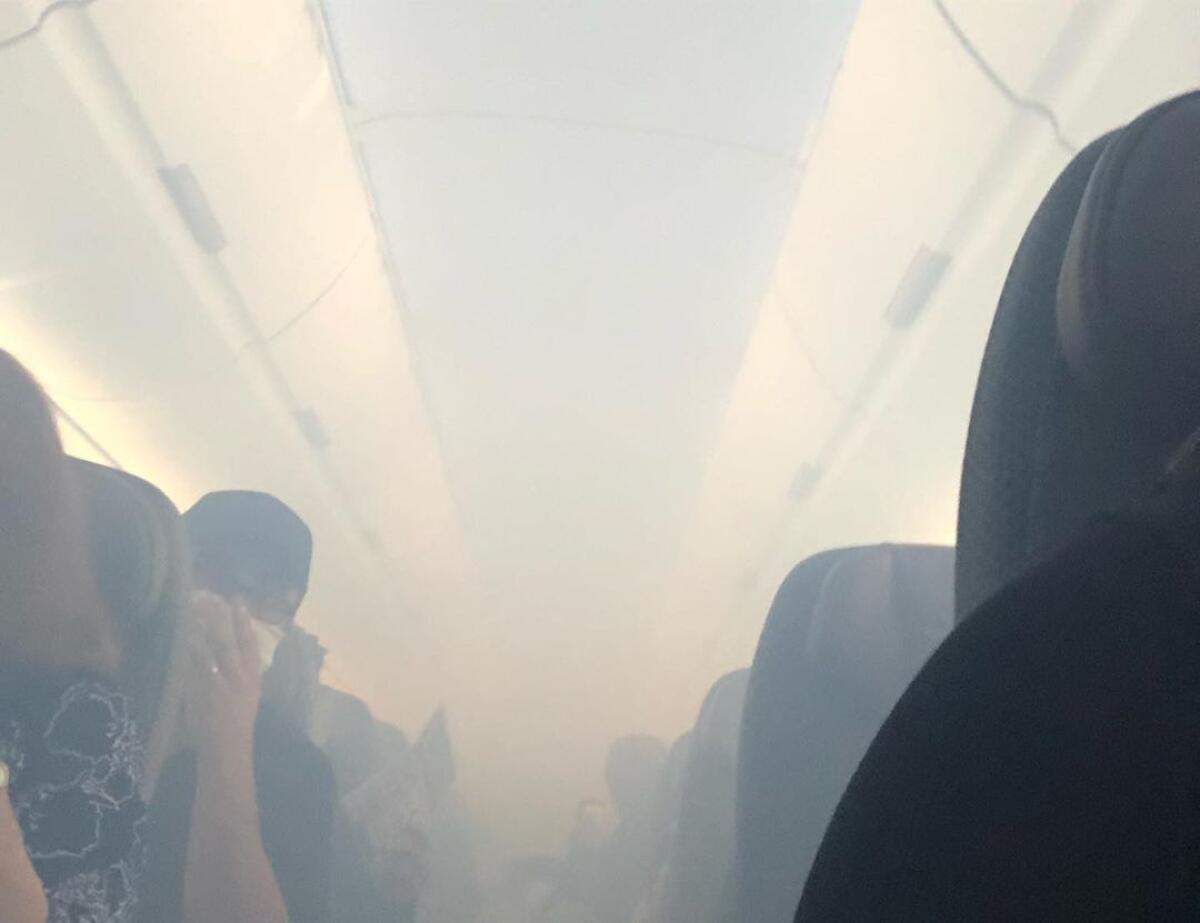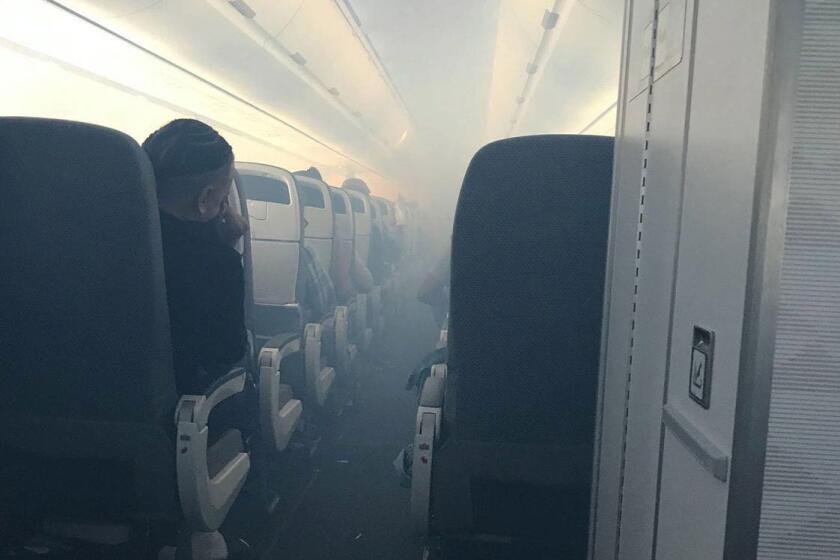After Times investigation, Congress is moving to curb toxic fumes on airplanes

The airline industry would be forced to adopt new measures to protect passengers and crew members from toxic fumes on airplanes under a bill introduced in Congress this week.
The move comes after a Los Angeles Times investigation found that dangerous vapors contaminate the air supply on planes with alarming frequency, sometimes sickening passengers and crew and incapacitating pilots during flights. Over a two-year period, nearly 400 pilots, flight attendants and passengers reported receiving medical attention after these “fume events,” and four dozen pilots were described as impaired to the point of being unable to perform their duties, The Times found.
“Cabin air can become dangerously contaminated with noxious substances, but the FAA and aircraft manufacturers are ignoring this health hazard even after concerning reports of flight crews becoming sick as a result,” Sen. Richard Blumenthal (D-Conn.), the bill’s sponsor, said in a statement.
The legislation would create new mandates for crew training and for reporting and investigating fume events. Planes would be required to be equipped with sensors to detect air contamination.
The measure aims to address problems underlying a basic fact of flying: The air you breathe on planes comes directly from the jet engines. Under normal conditions this so-called bleed air is safe, but if there’s a mechanical issue, heated jet engine oil and other aviation fluids can leak into the air supply, potentially releasing toxic gases into the plane.
The bill would require a major overhaul of current practices. No government agency tracks fume events or how often people become sick or impaired, and without sensors to measure air quality, planes rely on a low-tech method: the smell test. Internal documents from airlines and aircraft manufacturers provide detailed instructions for identifying oil and hydraulic fluid contamination in the air supply by smells like “dirty socks,” “musty” and “acrid,” The Times found.
The legislation would require airplanes to have sensors that would “alert the pilot and flight attendants to poor air quality that is dangerous to human health,” and it would mandate that airlines and manufacturers develop procedures on how to respond to alarms.
“All Americans have the right to expect safe, clean air when traveling or reporting to work,” Rep. John Garamendi (D-Walnut Grove), the bill’s sponsor in the House, said in a statement.
The bill is also co-sponsored by Sens. Edward J. Markey (D-Mass.) and Dianne Feinstein (D-Calif.) and Reps. Brian K. Fitzpatrick (R-Pa.), Kaiali’I Kahele (D-Hawaii) and Don Bacon (R-Neb.).
Major unions across the industry representing pilots, flight attendants and mechanics are backing the legislation.
“It’s not an over-the-top request that the flying public and cabin crew know whether the air they are breathing 30,000 feet above sea level is toxic or not,” Transportation Workers of America International President John Samuelsen said in a statement.
Scientists have long warned of potential dangers from breathing heated jet engine oil, which contains tricresyl phosphate, or TCP, a highly toxic chemical that can damage the nervous system. TCP can have immediate effects such as headaches and dizziness, as well as longer-term effects such as tremors and memory problems, experts say. Some pilots and flight attendants have experienced serious health problems, including brain damage, after fume events, The Times found.
Want to see if your flight passes the smell test? Here’s a quick guide based on industry sources.
The Assn. of Flight Attendants has called for the industry’s regulator, the Federal Aviation Administration, to take action on fume events for more than 25 years.
“Crews and passengers are breathing toxins and it has to stop,” AFA International President Sara Nelson said in a statement supporting the bill.
The FAA declined to comment on pending legislation. “Studies have shown cabin air is as good as or better than the air found in offices and homes,” the agency previously told The Times.
The proposed Cabin Air Safety Act is not the first time lawmakers have tackled the issue. Congress has twice held hearings on airplane air quality — in 1994 and 2003. Similar pieces of legislation have repeatedly languished in committee.
But today, recognition of the dangers of fume events is rising, and backers of the new legislation hope that the attention on airplane air during the pandemic will help tip the balance.
The bill currently faces little known opposition. Aircraft manufacturers Boeing and Airbus and Airlines for America, the air carriers’ lobbying arm, did not respond to questions about their positions on the legislation.
“Multiple studies over the years have consistently concluded that cabin air meets or exceeds health and safety standards,” Carter Yang, a spokesperson for Airlines for America, wrote in a statement.
Yet, studies on airplane air quality have only looked at normal flights in which no fume events were reported. No major research has ever measured the chemicals in fume events as they occur.
In 2003, Congress ordered the FAA to measure the toxic chemical levels in such events, but the airlines refused to let flight attendants carry air samplers aboard, according to an FAA-funded research report.
“The cabin air inside Boeing airplanes is safe,” a spokesperson for Boeing wrote in a statement to The Times on Wednesday. “Due to the high air exchange rate and HEPA recirculation filtration system, air quality on Boeing aircraft compares favorably to other indoor air environments like schools, office buildings, and homes, as numerous impartial, third-party studies have found.”
But HEPA filters are for particles — things like coronaviruses — not toxic gases.
Boeing’s statement noted that the company “continues to work with scientists to improve our understanding of cabin environmental factors and to study potential technologies such as sensors and advanced filtering.”
Boeing previously told The Times that scientific studies have not proved a link between fume events and health problems. The company previously said it has not equipped its planes with air sensors because suppliers have not “demonstrated the existence” of devices that could “reliably detect contaminated bleed air.”
The Times investigation found that Boeing managers had legal concerns that went beyond technological shortcomings. Senior Boeing engineers worried that data from sensors could prove damaging if used as evidence in lawsuits brought by sick passengers and crew members, according to internal emails and sworn depositions obtained by The Times.
An internal Boeing memo described it as a “risk” to give air sensors to even one airline, according to a deposition of a Boeing executive.
“Flight attendant, pilot unions, and congressional supporters could use this effort as evidence that sensors are needed and ... to drive their agenda forward to have bleed air sensors required on all aircraft,” said the 2015 memo, which Boeing turned over in litigation.
More to Read
Sign up for Essential California
The most important California stories and recommendations in your inbox every morning.
You may occasionally receive promotional content from the Los Angeles Times.













